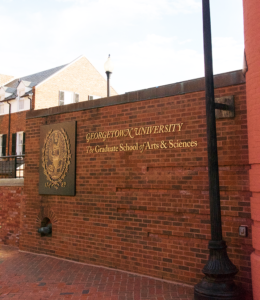The Graduate School of Arts and Sciences is set to introduce an interdisciplinary Master of Science in Aging and Health degree program next fall to confront issues facing an increasingly senior and aging population in the United States.
The new program is set to be housed in the Graduate School of Arts and Sciences but to draw from both undergraduate and graduate teaching faculty in Georgetown’s School of Nursing and Health Studies, McDonough School of Business, Law Center and McCourt School of Public Policy.
The number of Americans ages 65 and older is projected to more than double from 46 million today to over 98 million by 2060, and the 65-and-older age group’s share of the total population will rise to nearly 24 percent from 15 percent, according to the Population Reference Bureau.

The number of Americans ages 65 and older is projected to more than double from 46 million today to over 98 million by 2060, and the 65-and-older age group’s share of the total population will rise to nearly 24 percent from 15 percent, according to the Population Reference Bureau.
Norberto Grzywacz, dean of the Graduate School of Arts and Sciences, developed the program in response to the increasing demand for expertise on aging issues as world demographics shift and the 65-and-older age group continues to expand.
“Aging occurs because of biological reasons, but its impact on societies where people are living longer and having fewer children are wide ranging. One sees impacts on the economy, health-administrations systems, public policy, law, and so on,” Gryzwacz wrote in an email to The Hoya. “The new Aging and Health program is the first to encompass all these dimensions and more in the training of its students.”
The creation of the program involved a two-year preparatory process, during which the Graduate School developed the curriculum and faculty body, conducted market research and settled other logistical issues. The Executive Committee of Graduate Studies approved the proposal last January, followed by assent from the university’s Board of Directors last June.
Gryzwacz says it is necessary for scholars to leave their disciplinary comfort zones to facilitate productive dialogue to address society’s issues related to aging.
“Urgent and complex social problems are often intractable within the framework of individual disciplines. Having such interdisciplinary programs offers an opportunity to turn a small portion of the university towards societal good,” Gryzwacz wrote.
Pamela Saunders, associate professor and program director, said the program will bridge a gap in knowledge on aging in the Washington, D.C. metro area, where no other degrees in gerontology, the study of aging, are offered.
In anticipation of the recruitment process, Saunders said the primary challenge lies in unraveling the popular misconception of aging as a depressing or dull topic to study. The program aims to combat this negative sentiment surrounding the very idea of aging with the message that a master’s degree in aging can provide learners with skills and knowledge applicable in the marketplace.
Saunders cites the growing market for well-trained gerontologists, especially in the realm of health care, as a primary incentive to join the program.
Stressing the versatility of the programs’ teachings, Saunders said students will enter the workforce with strong problem-solving skills and a clear conceptualization of aging issues ranging from transportation logistics to health care financing.
“Aging goes with everything. You could study marketing and aging and understand how to market to an older population; you could study economics and aging and understand how to develop health care products,” Saunders said. “So a knowledge of aging is going to enable you to do almost any career.”
Saunders said the program will attract three groups of people: new career students interested in studying aging, mid-career students wanting the specialization for job purposes and early retirees hoping to contribute their own experience or revamp a career of some kind.
Associate professor Robert Friedland, who will teach the “Health Care Economics” course this fall, said his class will educate policy and business-oriented people who understand that an aging population poses many contemporary policy issues.
“The primary goal of the course is to better understand how the financing of care can affect the organization and delivery of care and to fully appreciate the challenges when this structure fails to meet the needs of people,” Friedland said.
Elliott Crooke, senior associate dean of faculty and academic affairs at the Georgetown University Medical Center, said the program’s partnership with the Medical Center will allow students to better understand the challenges facing our older generations in areas extending beyond biology.
“Indeed, we often think of age-related disorders when we think of aging, and that is a critical component of well-being, but issues involving policy, economics, employment and ethics are intertwined in our master’s program so that candidates can achieve a comprehensive examination of the complex issues facing our seniors,” Crooke wrote in an email to The Hoya.



















